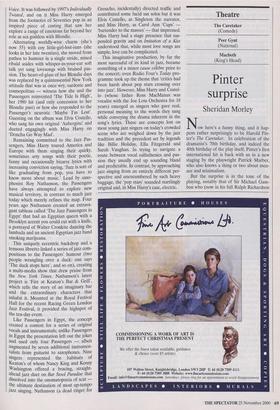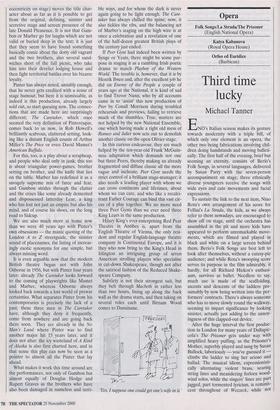Theatre
The Caretaker (Comedy) Peer Gynt (National) Macbeth (King's Head)
Pinter surprise
Sheridan Morley
Now here's a funny thing, and it hap- pens rather surprisingly to be Harold Pin- ter's The Caretaker. In celebration of the dramatist's 70th birthday, and indeed the 40th birthday of the play itself, Pinter's first international hit is back with us in a new staging by the playwright Patrick Marber, who also knows a thing or two about men- ace and minimalism.
But the surprise is in - the tone of the playing, notably that of Sir Michael Gam- bon who (now in his full Ralph Richardson eccentricity on stage) moves the title char- acter about as far as it is possible to get from the original, defining, sinister and secretive stage and screen presence of the late Donald Pleasence. It is not that Gam- bon or Marber go for laughs which are not valid or buried deep in the text; it is just that they seem to have found something basically comic about the dotty old vagrant and the two brothers, also several sand- wiches short of the full picnic, who take him into their derelict lodging house and then fight territorial battles over his bizarre loyalty.
Pinter has always noted, amiably enough, that he never gets credited with a Sense of stage humour, but here it is unmissable, as indeed is this production, already largely sold out, so start queuing now. The connec- tions that are made here are surprisingly different; The Caretaker, which once seemed the very definition of Pinteresque, comes back to us now, in Rob Howell's brilliantly scabrous, cluttered setting, look- ing like a distant English cousin of Arthur Miller's The Price or even David Mamet's American Buffalo.
For this, too, is a play about a scrapheap, and people who deal only in junk; this too is about triangular power-games, brother setting on brother, and the knife that lies on the table. Marber has redefined it as a savagely supreme mix of farce and fear, and Gambon strides through the clutter and the crises like some already demented and dispossessed latterday Lear, a king who has lost not just an empire but also his mind, and of course his shoes, on the long road to Sidcup.
We are also much more at home now than we were 40 years ago with Pinter's own obsessions — the manic quoting of the London A to Z streetguide, the sinister sound of placenames, the listing of increas- ingly exotic synonyms for one simple, but always missing word.
It is even arguable now that the modern British theatre began not with John Osborne in 1956, but with Pinter four years later; already The Caretaker looks forward to the coming of playwrights like Mamet and Marber, whereas Osborne always looked back towards a lost world of prewar certainties. What separates Pinter from his contemporaries is precisely the lack of a past; these three men in The Caretaker have, although they deny it frequently, come from nowhere and are going back there soon. They are already in the No Man's Land where Pinter was to find another major hit 15 years later, and it does not alter: the icy wasteland of A Kind of Alaska is also first charted here, and in that sense this play can now be seen as a pointer to almost all the Pinter that lay ahead.
What makes it work this time around are the performances, not only of Gambon but almost equally of Douglas Hodge and Rupert Graves as the brothers who have also been damaged in nameless and teal- ble ways, and for whom the dark is never again going to be light enough. The Care- taker has always chilled the spine; now, it also tickles the ribs, and the balancing act of Marber's staging on the high wire is at once a celebration and a revelation of one of the half-dozen greatest British plays of the century just ended.
If Peer Gynt had indeed been written by Synge or Yeats, there might be some pur- pose in staging it as a rambling Irish poetic drama to match Playboy of the Western World. The trouble is, however, that it is by Henrik Ibsen and, after the excellent job he did on Enemy of the People a couple of years ago at the National, it is kind of sad to find Trevor Nunn, who by all accounts came in to 'assist' this new production of Peer by Conall Morrison during troubled rehearsals and previews, failing to retrieve much of the shambles. True, matters are not helped by the new National Ensemble, one which having made a right old mess of Romeo and Juliet now sets out to demolish another classic on the open Olivier stage.
In this curious endeavour, they are much helped by the ten-year-old Frank' McGuin- ness adaptation which demands not one but three Peers, thereby making an already fragmented and diffuse classic all the more vague and inchoate. Peer Gynt needs the strict control of a brilliant stage-manager; it also needs a leading player with whom we can cross continents and lifetimes, about whom we can care, and who like a recalci- trant Father Courage can bind this vast cir- cus of a play together. We no more need three Peer Gynts than we ever need three King Lears in the same production.
Hilary King's ever-enterprising Red Pear Theatre in Antibes is, apart from the English Theatre of Vienna, the only resi- dent and regular English-language theatre company in Continental Europe, and it is they who now bring to the King's Head in Islington an intriguing group of seven American strolling players who specialise in cut-down Shakespeare, though not after the satirical fashion of the Reduced Shake- speare Company.
Subtlety is not their strongest suit, but they belt through Macbeth in rather less than two hours, lining up along the back wall as the drama starts, and then taking on several roles each until Birnam Wood comes to Dunsinane.
Tes, I suppose one could get one's wife in it.'






























































































 Previous page
Previous page